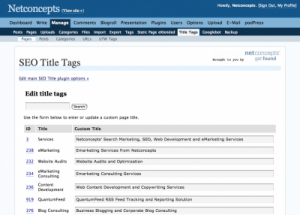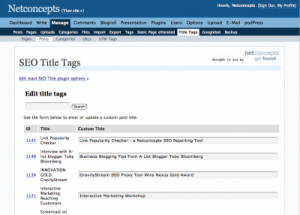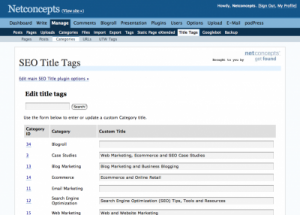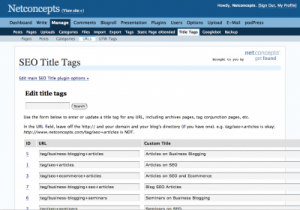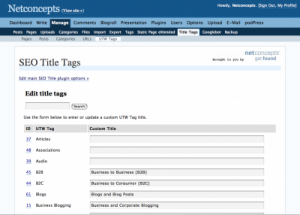SEO Title Tag 2.3.3
Note: SEO Title Tag 2.3.3 adds compatibility with WordPress 2.7!
*** With SEO Title Tag version 2.3.0 we have dropped support of versions of WordPress prior to 2.3 if you are still using an older version of WordPress you should be able to continue using legacy version 2.2.1.
Title tags are arguably the most important of the on-page factors for search engine optimization (“SEO”). It blows my mind how post titles are also used as title tags by WordPress, considering that post titles should be catchy, pithy, and short-and-sweet; whereas title tags should incorporate synonyms and alternate phrases to capture additional search visibility.
Now, thankfully, there is a solution, allowing you to decouple post titles from title tags. Introducing… the SEO Title Tag 2.3.3 WordPress plugin.
SEO Title Tag makes it dead-easy to optimize the title tags across your WordPress-powered blog or website. Not just your posts, not just your home page, but any and every title tag on your site! If this plugin, along with a few hours of keyword research and copywriting of optimized titles, doesn’t make a significant impact on your search traffic, you’re doing something wrong!
SEO Title Tag is authored by SEO specialist Stephan Spencer. Version 2.0 was a collaborative effort — Stephan did the concept development and Oliver Kastler, Mike Harding and Elton Fry did all the heavy lifting. Since version 2.1 Andrew Shell has taken over development responsibilities. It is completely free and has been released as “open source” under the GPL license. So enjoy!
Features include:
- Allows you to override a page’s or a post’s title tag with a custom one.
- New for v2.0 A Title Tag input box in the Edit Post and Write Post forms. (Previously in version 1.0 you had to use the Custom Field box.)
- New for v2.0 Mass editing of title tags for all posts, static pages, category pages, tag pages, tag conjunction pages, archive by month pages, — indeed, any URL — all in one go.
- Define a custom title tag for your home page (or, more accurately, your Posts page, if you have chosen a static Front Page set under Options -> Reading), through the Options -> SEO Title Tag page in the WordPress admin.
- New for v2.0 Define the title tag of 404 error pages, also through Options -> SEO Title Tag.
- New for v2.0 Handles internal search result pages too.
- New for v2.0 Title tags of category pages can optionally be set to the category description. If you use a Meta Tag plugin like Add Meta Tags, then you should not use this feature and instead let the Meta Tag plugin use the category description for the meta description on category pages.
- If you choose to keep the blog name in your title tags (not recommended!), the order of the blog name and the title are automatically reversed, giving more keyword prominence to the title instead of the blog name. Note there is also an option to replace your blog name with a shorter blog nickname.
And best of all, the plugin is FREE!
Suitably convinced? Then Download the plugin!
NEW: Rate this plugin at WordPress.org
Screenshots
Installation instructions
- (If upgrading from a prior version of SEO Title Tag, be sure to deactivate the old version beforehand.)
- Upload the seo-title-tag directory and the files within it to your wp-content/plugins directory.
- Activate the plugin.
- Under Presentation -> Theme Editor in the WordPress admin, select “Header” from the list and replace:
<title><?php bloginfo('name'); wp_title(); ?></title>(or whatever you have in your <title> container with:
<title><?php if (function_exists('seo_title_tag')) { seo_title_tag(); } else { bloginfo('name'); wp_title();} ?></title> - Configure the settings under Options -> SEO Title Tag. You’ll want specify a title tag for your home page which will override your blog name as the home page’s title tag, specify a title tag for 404 error pages. You can also configure here whether you want all the rest of your site’s title tags to have your blog name, or a shortened version of your blog name, or neither, appended to the end. IMPORTANT: You must save the settings, even if you haven’t changed them from their defaults, in order to ensure that the title tags for Posts and for Pages works properly.
- For those of you with a static Front Page chosen under Options -> Reading, the “home page” described in the point above is actually the Posts page, and as such, the SEO Title Tag options page will actually will say “Posts Page” instead of “Home Page” — because it detects that you have selected a static Front Page. In such a scenario, in order to also customize the Front Page’s title tag, specify a Title Tag on that page’s Edit Page form, or within Manage -> Title Tags -> Pages.
- Define custom title tags for your existing posts, static pages, category pages and tag pages in the admin under Manage -> Title Tags.
- When writing a new post/page, define a title tag by typing something into the “Title Tag (optional)” field. If you’re happy to use the post title as the title tag, then you can leave it blank.
- Note: If upgrading to WordPress 2.3 from a prior version where you used the SEO-Title-Tag plugin with Ultimate Tag Warrior (UTW) in order to migrate your old tag page titles you need to first import your UTW tags into the new native tagging structure. You can do this in your WordPress admin by clicking on Manage > Import > Ultimate Tag Warrior. Once you have these imported just deactivate and reactivate SEO-Title-Tags and your old title tags will be able to be used.
To learn more about search engine optimizing your WordPress blog, you’ll probably want to read Stephan Spencer’s 10 tip series on Blog SEO.
To-do
- support mass editing of meta descriptions?
- import titles by uploading a file in CSV format
- possibly rename custom option fields and table name
- add some more text to the titles of tag pages globally. They are using the same divider as used for posts, and really there should be an option to add something like “Tag | Posts Related to Tag | Blog Name”
- create all needed values on activation so that you no longer have to save the settings in the SEO Title Tag Options before the plugin will work properly
Feedback?
Got a bug to report? Or an enhancement to recommend? Or perhaps even some code to submit for inclusion in the next release?
UPDATE: 2.0beta2 has some important bug fixes, including the issue where Options weren’t updating and the Manage > subtab wasn’t displaying.
UPDATE: 2.0beta3 has more important bug fixes, including the issue where MySQL tables were sometimes not being created, and PHP tags weren’t all consistently starting with <?php but instead the <? shorthand which doesn’t work on some server configurations.
UPDATE: 2.0beta5 has more fixes for MySQL issues some folks were having. Also fixed a IIS server incompatibility issue.
UPDATE: 2.0beta6 fixes a problem where some folks were seeing a “No Posts Found” message under Manage -> Title Tags -> Posts even though the blog has posts. And it fixes a problem for users of WordPress version 2.0.5 and earlier, where titles on category pages weren’t showing up due to an undefined function attribute_escape (a new function introduced in WordPress 2.0.6).
UPDATE: 2.0beta7 fixes a problem with the page number sometimes appearing on static pages and a problem with a MySQL error on the Manage > Title Tags > Posts page.
UPDATE: 2.0RC1 fixes categories showing a warning if there are no category title tags set; Manage Posts filtering out everything thats not a post (images, pages). Also added and tested fix for menu links (“edit.php”).
UPDATE: 2.0RC2 fixes a problem with backslashes appearing before apostrophes.
UPDATE: 2.1.0 adds WordPress 2.3 compatibility.
UPDATE: 2.1.1 fixes bug where old title tags for UTW tag pages weren’t being imported. Also fixes WordPress 2.3 bug of not displaying page titles for tag intersections and unions correctly.
UPDATE: 2.1.2 fixes display issues with international characters.
UPDATE: 2.1.3 fixes issue with extra slashes being added. Also adds Nonce support for extra security.
UPDATE: 2.3.0 updates the layout to display better in the new WordPress admin.
UPDATE: 2.3.1 fixed an issue where in WordPress 2.6.1 saving a post/page creates multiple title_tag custom fields.
UPDATE: 2.3.2 fixed an issue where if you were using nested pages (the parent functionality) fields might not show up on the mass edit screen.
UPDATE: 2.3.3 fixed an issue with the tabs not working on WordPress 2.7 and ideally some issues with updates not sticking on the mass edit page.
About the Author
This plugin was developed by SEO specialist, Stephan Spencer. You can read more at Stephan’s website.

Chapter 6:
Keyword Research
From the fundamentals of link building to the nuances of natural linking patterns, virality, and authority.
Related Posts

Thursday Three: Embrace Journaling, Tackle Tardiness, and Explore Our Energetic Echo
Here’s what I found inspirational, challenging, or just downright hilarious this week. What caught your eye? And, remember to check out this week’s great podcast episodes: Scaling a SaaS Company with Jason Morehouse “A crucial factor to business success is to find and take the personal path that works best for you.” — Jason Morehouse […]
Read More
Thursday Three: Harrison’s harmony, conquering a blank canvas, & gut health hacks
Here’s what I found inspirational, challenging, or just downright hilarious this week. What caught your eye? And, remember to check out this week’s great podcast episodes: Be a Sales Game Changer with Fred Diamond “True elite sales professionals develop a dedicated mindset, proactive client interaction, and continuous self-preparation. They understand their client’s needs and enable […]
Read More
Thursday Three: Rebirth of sleeper trains, 4,000 weeks is a long/short time, and golden age for medicine
Here’s what I found inspirational, challenging, or just downright hilarious this week. What caught your eye? And, remember to check out this week’s great podcast episodes: A Story Worth Retelling with Luke Storey “Aligned values are the cornerstone of successful partnerships, whether in business or life, as they shape our moral code, define our priorities, […]
Read More